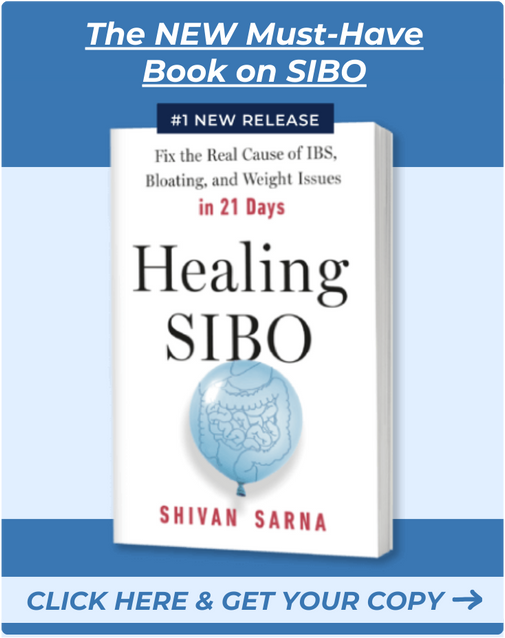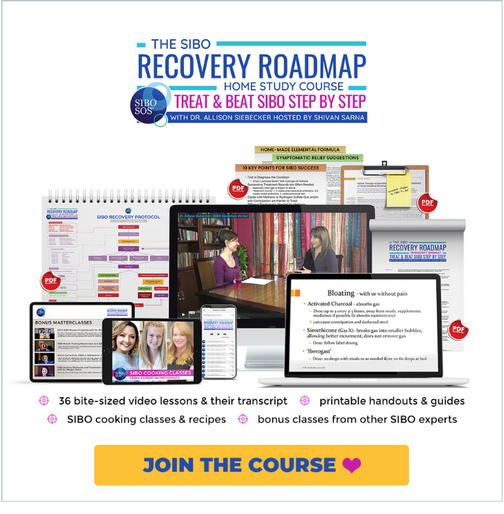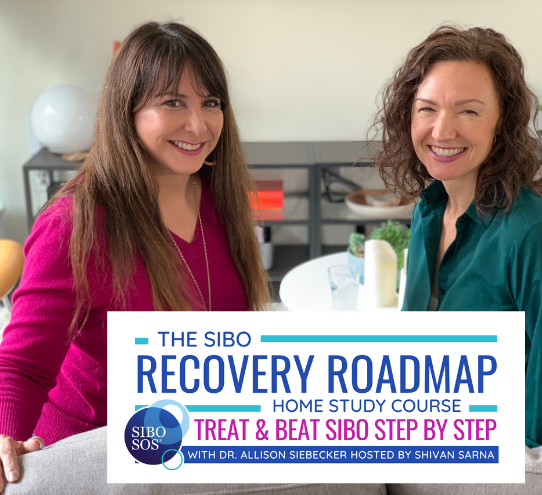In This Episode:
- What the journey from SIBO diagnosis to treatment is
- Why SIBO can become a recurrent condition
- What a small bowel follow through is and what it can tell you
- How to live with and treat a chronic condition, such as recurrent SIBO
- What changes you need to make in your life, both long and short term, to make a chronic condition more manageable
- Why you need to come to terms with the fact that you have SIBO
- How dietary modifications can have a positive impact on symptoms of SIBO
- What medication is available and why it’s important to find one that works with your body
- What herbal prokinetic options are available and how much you should take
- How you can make prokinetics more manageable for your body
For some people, a SIBO diagnosis is a one and done treatment plan. For others, SIBO can be recurring and chronic, leading to lifelong symptoms and the need to make long-term changes to your life. Today’s guest, Dr. Megan Taylor, has had symptoms of SIBO since she was a child, but after finally getting a diagnosis in her 20s, started taking back control of her life.
Listen To The Podcast Here:
Or listen on your favorite podcast app: Apple Podcasts | Spotify | Android | TuneIn
Megan works with children and adults to help them get to the bottom of their gastrointestinal issues, including SIBO and IBS. She believes that there is a lot of relief in finally getting a diagnosis of SIBO, because once you have one, you can start to treat and live with the condition. However, because of its nature, a SIBO diagnosis is far from easy, especially when it’s a recurrent condition.
A chronic diagnosis can come after a variety of tests and physical exams are performed. Megan’s was personally diagnosed after she had a “small bowel follow through” that declared she had a blockage in her small intestine. While she was disheartened to learn this was something she would have for her entire life, she knew she could manage it.
What made the difference for Megan was accepting her condition. When she learned to accept the body she has, instead of constantly striving to change it, she finally began to heal. By using both short-term and long-term changes, she has managed to successfully manage her SIBO for many years.
We talk about what some of these changes are, highlighting the importance of dietary changes to help control SIBO symptoms. Megan shares information about antimicrobials and prokinetics, as well, explains why these are both good to include in your routine, and, maybe most vitally, how to introduce them safely.
Do you have chronic SIBO? Have you introduced any prokinetics, herbal or otherwise, into your diet to help control your SIBO symptoms? What dietary changes have you made to help manage your SIBO?
Quotes:
“I think the most important thing when you first get diagnosed with SIBO is to understand that SIBO is not really a diagnosis, right? SIBO happens as a result of some other underlying condition.” (2:48)
“You can live the life you want to live – with a chronic case of SIBO.” (6:30)
“If you struggle with constipation, and that’s kinda the big symptom that you’re working with with your SIBO… People with constipation really, really struggle with prokinetics. And there’s a lot of good, sciency stuff we could get into to explain why, but that build up of pressure as a result of constipation often will contribute to the tendency to develop reflux.” (18:56)
This episode is sponsored by Just Thrive Probiotic & Antioxidant
This podcast brought to you by:
Links
Join Dr. Allison Siebecker and Shivan Sarna in the SIBO Recovery Roadmap Course
25% off the ibs-smart™ test – Use code sibosos2021 at check out
Get Access to the Complete Course Catalog
Learn more about SIBO SOS Online | Facebook














